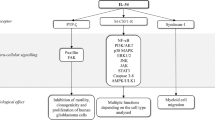Abstract
Many tumors co-express growth factors and their receptors; thus, the concept of autocrine secretion was proposed to explain the unrestrained growth of the malignant cells. Autocrine stimulation refers to positive autocrine secretion, which functions to stimulate cell growth. Many of the positive autocrine loops have been demonstrated in human colorectal carcinoma (CRC), which are considered to play an important role in the initiation and progression of the cancer. These autocrine loops provide information for prognostic markers and targets for biological therapies of CRC. Interruption of the autocrine loops could potentially inhibit malignant cell growth. The field is encouraging but further research is needed.
Similar content being viewed by others
References
Eisenhauer EA. From the molecule to the clinic—inhibiting HER2 to treat breast cancer. N Engl J Med 2001; 344:841–842.
al-Azzawi F, Wahab M. Estrogen and colon cancer: current issues. Climacteric 2002; 5:3–14.
Sporn MB, Todaro GJ. Autocrine secretion and malignant transformation of cells. N Engl J Med 1980; 303:878–880.
Sporn MB, Roberts AB. Autocrine growth factors and cancer. Nature 1985; 313:745–747.
Huang SA, et al. Growth modulation by epidermal growth factor (EGF) in human colonic carcinoma cells: constitutive expression of the human EGF gene. J Cell Physiol 1991; 148:220–227.
Jiang D, et al. Autocrine transforming growth factor alpha provides a growth advantage to malignant cells by facilitating re-entry into the cell cycle from suboptimal growth states. J Biol Chem 1998; 273:31471–31479.
Johnson GR, et al. Autocrine action of amphiregulin in a colon carcinoma cell line and immunocytochemical localization of amphiregulin in human colon. J Cell Biol 1992; 118:741–751.
Venkateswarlu S, et al. Autocrine heregulin generates growth factor independence and blocks apoptosis in colon cancer cells. Oncogene 2002; 21:78–86.
Huang F, Newman E, Theodorescu D, Kerbel RS, Friedman E. Transforming growth factor beta 1 (TGF beta 1) is an autocrine positive regulator of colon carcinoma U9 cells in vivo as shown by transfection of a TGF beta 1 antisense expression plasmid. Cell Growth Differ 1995; 6:1635–1642.
Baghdiguian S, Verrier B, Gerard C, Fantini J. Insulin like growth factor I is an autocrine regulator of human colon cancer cell differentiation and growth. Cancer Lett 1992; 62:23–33.
Lamonerie T, Lavialle C, Haddada H, Brison O, IGF-2 autocrine stimulation in tumorigenic clones of a human colon-carcinoma cell line. Int J Cancer 1995; 61:587–592.
Lamonerie T, Lavialle C, de Galle B, Binoux M, Brison O. Constitutive or inducible overexpression of the IGF-2 gene in cells of a human colon carcinoma cell line. Exp Cell Res 1995; 216:342–351.
New BA, Yeoman LC. Identification of basic fibroblast growth factor sensitivity and receptor and ligand expression in human colon tumor cell lines. J Cell Physiol 1992; 150:320–326.
Lahm H, et al. Interleukin 4 down-regulates expression of c-kit and autocrine stem cell factor in human colorectal carcinoma cells. Cell Growth Differ 1995; 6:1111–1118.
Hoosein NM, Kiener PA, Curry RC, Brattain MG. Evidence for autocrine growth stimulation of cultured colon tumor cells by a gastrin/cholecystokinin-like peptide. Exp Cell Res 1990; 186:15–21.
Wu P, et al. Gastrin stimulated growth of colorecal carcinoma. World Chin J Digestol 1999; 7:501–503.
Rosenberg IM, Goke M, Kanai M, Reinecker HC, Podolsky DK. Epithelial cell kinase-B61: an autocrine loop modulating intestinal epithelial migration and barrier function. Am J Physiol 1997; 273:G824–832.
Brew R, et al. Interleukin-8 as an autocrine growth factor for human colon carcinoma cells in vitro. Cytokine 2000; 12:78–85.
Ducroc R, et al. Trypsin is produced by and activates protease-activated receptor-2 in human cancer colon cells: evidence for new autocrine loop. Life Sci 2002; 70:1359–1367.
Darmoul D, Marie JC, Devaud H, Gratio V, Laburthe M. Initiation of human colon cancer cell proliferation by trypsin acting at protease-activated receptor-2. Br J Cancer 2001; 85:772–779.
Lahm H, et al. Growth regulation and co-stimulation of human colorectal cancer cell lines by insulin-like growth factor I, II and transforming growth factor alpha. Br J Cancer 1992; 65:341–346.
Wang D, et al. Activation of the TGFalpha autocrine loop is downstream of IGF-I receptor activation during mitogenesis in growth factor dependent human colon carcinoma cells. Oncogene 2002; 21:2785–2796.
Howell GM, et al. Regulation of autocrine gastrin expression by the TGF alpha autocrine loop. J Cell Physiol 1995; 162:256–265.
Bellone G, et al. Growth stimulation of colorectal carcinoma cells via the c-kit receptor is inhibited by TGF-beta 1. J Cell Physiol 1997; 172:1–11.
Zvibel I, Brill S, Halpern Z, Papa M. Amphiregulin and hepatocyte-derived extracellular matric regulate proliferation and autocrine growth factor expression in colon cancer cell lines of varying liver-colonizing capability. J Cell Biochem 1999; 76:332–340.
Barozzi C, et al. Relevance of biologic markers in colorectal carcinoma: a comparative study of a broad panle. Cancer 2002; 94:647–657.
Watson SA, et al. Anti-gastrin antibodies raised by gastrimmune inhibit growth of the human colorectal tumour AP5. Int J Cancer 1995; 61:233–240.
Williams KJ, Telfer BA, Stratford IJ, Wedge SR. ZD1839 (“Iressa”), a specific oral epidermal growth factor receptor-tyrosine kinase inhibitor, potentiates radiotherapy in a human colorectal cancer xenograft model. Br J Cancer 2002; 86:1157–1161.
Adachi Y, et al. Effects of genetic blockade of the insulin-like growth factor receptor in human colon cancer cell lines. Gastroenterology 2002; 123:1191–1204.
Author information
Authors and Affiliations
Corresponding author
Rights and permissions
About this article
Cite this article
Ruan, WJ., Lai, MD. Autocrine stimulation in colorectal carcinoma (CRC). Med Oncol 21, 1–7 (2004). https://doi.org/10.1385/MO:21:1:01
Received:
Accepted:
Issue Date:
DOI: https://doi.org/10.1385/MO:21:1:01




